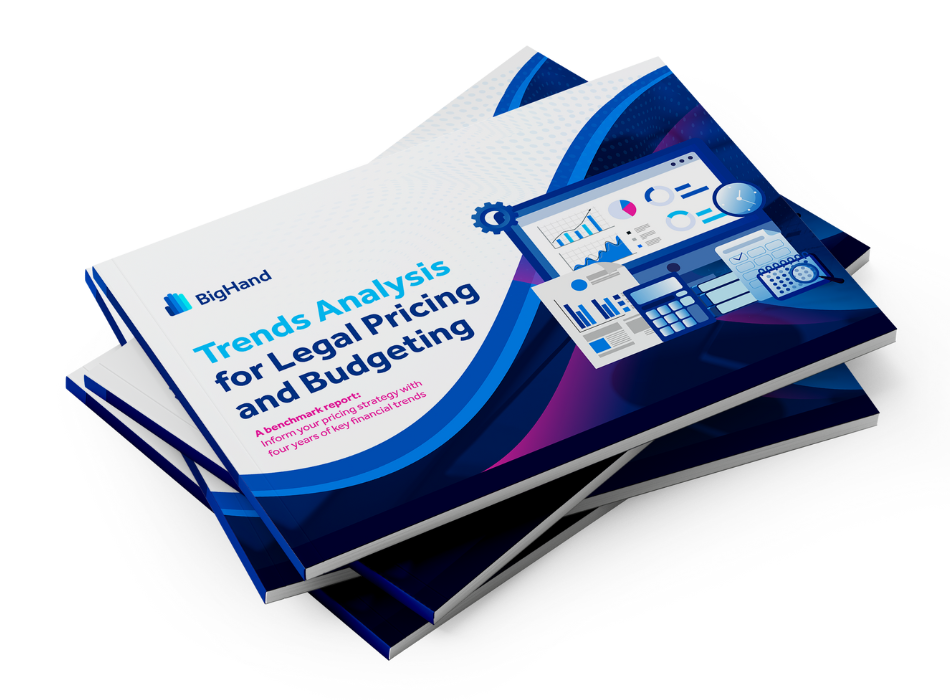BigHand conducts annual surveys gathering responses from over 800 senior legal finance professionals on their legal pricing and budgeting strategies.
Legal technology expert Brian Taaffe gives his thoughts on what the trends reveal and how firms can safeguard profitability.
What trend or statistic stood out to you?
The one that resonated would be this one about financial transparency. We saw 30% of firms surveyed said that there was an increase. Now, why this is interesting to me is it talks about the rise of data.
Everywhere, we're seeing more data, more frequent data, to everyone. And this is just another way of saying that everyone wants more upfront.
How does matter budgeting help with financial transparency?
Matter budgeting needs to be included in the process for financial transparency. The reason being is that there's so much information and so many people that unless you have the ability to really say what could happen and have it structured, you're not going to see the results you want.
Now, with clients today, they're almost demanding this, and so if you don't have it, you may not even win the deal.
How important is training lawyers on more commercial awareness for more profitable outcomes?
Training the lawyers, whether it be partners or associate, is paramount around matter budgeting. The reason being is that - look at lawyers, and this is not a judgment call or anything, but a lot of lawyers tend to be less analytical and I'm not saying that it's a prerequisite, but it's more about their writing, how they're wording things.
Unless it's changed today, I don't see Law Firm Economics 101 being taught. To me, it's almost like you're missing something critical. Although they are lawyers, they're also project managers, they are consultants. They wear all of these hats, and they do it so well that people don't even think they are.
If we're not going to train them on stuff that would move the needle 5%, well then all they're going to do is work harder, as opposed to work smarter. For me, this training is actually making them a more efficient lawyer, a better lawyer.
You'll notice that if you're looking at some of the younger generations that are coming in, they're using this because they're used to it, and because of that, we're seeing good margins from them, because they're actually understanding how their work is impacting the overall firm.
How can heightened commercial awareness benefit lawyers?
Let's actually start with the statistics. In 2024, we've seen 45% of the participants claim to use a dedicated legal pricing or budgeting system with a further, I think about 19%, planning to introduce one in the next 12 months.
So what we are seeing is that there are benefits for using this, and we're seeing people wanting to. Why budgeting? I think this is a great introduction into commercial awareness, because it's relevant to the individual lawyer. Meaning, when you get them to use a budget, it is for their matters, and then you can see their book of business.
You can see their aggregate "I am contributing X percent to the company" versus everyone else. So in a lot of ways, this is a good way to start it, because when you're looking at budgeting, there's a lot of levers.
There's the rate setting up front. Are we going to discount the client? Then there's some inefficiencies, then there's some pricing, whether it's AFA, fixed fee or whatever. All of that starts to get them to understand it at a higher level.
If you start to introduce that in the early stages of a lawyer, when they become a partner or practice group lead, it's already been embedded in their process. To me, getting that system is a start. It won't give everything, but at least gives them an introduction where you can start to then further that along with an additional training program or understanding on how profit and compensation works.
Basically the budgeting is what they're doing every day. If you get them to understand the commercial awareness there, it's going to be a lot easier to translate that into profit and everything else.







